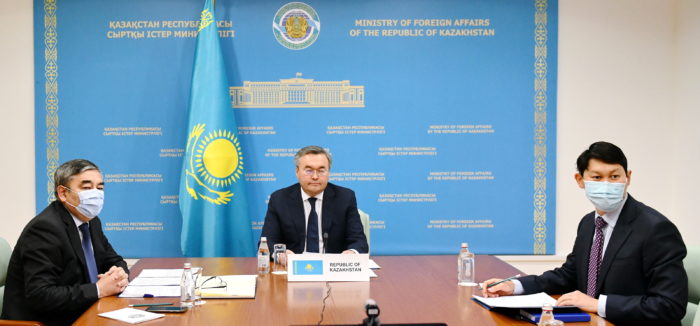New-York – In the midst of its annual General Debate, held every September, the United Nations General Assembly held a Special High-Level Plenary Meeting, at its Headquarters in New York, on the International Day for the Total Elimination of Nuclear Weapons. And Kazakhstan played a prominent part in the meeting, since the issue is an important cornerstone of the nation’s foreign policy.

Kazakh Minister of Foreign Affairs Mukhtar Tileuberdi delivered remarks at the event. Photo credit: Mfa.kz.
As the opening speaker, UN Secretary-General Antonio Guterres sounded the keynote, saying that “Nuclear Disarmament has been a priority of the United Nations since the very beginning of the Organization’s existence.” Guterres was disturbed, however, that “Some states view nuclear weapons as vital to their national security and survival.” Their elimination, however, “is vital to something beyond the fate of any single state: the survival of life on this planet.”
But some clouds darken the horizon: progress toward nuclear abolition has stalled, and tensions between nuclear states have grown. Furthermore, efforts to “modernize” arsenals have threatened to cause a “qualitative” nuclear arms race. There is but a single treaty constraining these threats, and it is set to expire early next year. The U.S.A. and the Russian Federation, therefore, should extend the “New START Treaty” for the maximum of five years. That treaty, which was signed in Prague in 2011, has an option to be extended for a further five years, until February 5, 2021.
States possessing nuclear weapons, said the Secretary-General, have an obligation to lead this endeavor. And that endeavor must lead to “a common path towards nuclear disarmament.” But the only way to totally eliminate risk is to totally eliminate nuclear weapons. The Covid-19 pandemic has only served to expose the fragility of current, incomplete arrangements.
The second major UN official to address the Meeting was the current President of the General Assembly, Volkan Bozkir of Turkey. A distinguished diplomat who has spent nearly half a century in his country’s foreign service, Bozkir was most recently Minister of European Union Affairs, until being chosen in May 2020 as the President of the General Assembly’s 75th Session. He is serving from September 2020 to September 2021, as a member/representative of the Assembly’s Western European and Other Countries Group (WEOG), to which Turkey belongs.
Bozkir began by remembering the up to 226,000 Japanese who lost their lives in the nuclear bombings of Hiroshima and Nagasaki. Hence, the very first Resolution passed by the First Session of the General Assembly [Meeting in London] in 1946 urged all nations to achieve global nuclear disarmament. And the only way to eliminate the risk and threat of nuclear weapons is…to eliminate the weapons themselves.
The recent step—already taken—in this process was the Treaty on the Prohibition of Nuclear Weapons, signed in 2017. This year also marks the 50th Anniversary of the Treaty on the Non-Proliferation of Nuclear Weapons (NPT). The NPT Review Conference (held every five years) will next be held in 2021. “Nuclear disarmament”, Bozkir concluded, “must remain a priority to all of us.”
The address of Foreign Minister, Mukhtar Tileuberdi, brought Kazakhstan’s unique perspective to bear on the Agenda of the meeting. He first cited the address of President Kassym-Jomart Tokayev, noting his country’s “bold and unwavering vision of [my] country to achieve a nuclear-weapon-free world.”
The Foreign Minister mentioned the critically-important closing of the Semipalatinsk Nuclear Test Site, and asserted Kazakhstan’s “moral right to be always at the forefront of international efforts’ toward nuclear disarmament”. He also spoke of development efforts in that Semipalatinsk region. And he mentioned a Resolution to be proposed this year, on international cooperation and environmental restoration. Therefore, the world needs to accelerate momentum for a Treaty on Nuclear Weapons.
In view of the above, the Foreign Minister said that—particularly in this age of Covid-19—priorities and resources need to be dramatically shifted toward global public health, climate mitigation and sustainable development. These priorities (which should aim at the UN’s 100th Anniversary in 2045) have already been established by Kazakhstan’s first president, Nursultan Nazarbayev. They should remain our priorities today, and in the future.

